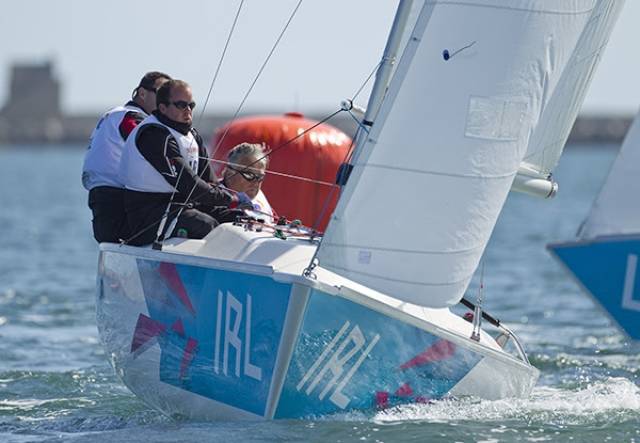Some people just keep going and going. Ireland's Sonar helm, John Twomey, of Kinsale Yacht Club, can safely be put in to that bracket as he enters his 11th Paralympic Games at Rio 2016 writes Richard Aspland.
It is this longevity that has appealed to Twomey's Paralympic committee to give the evergreen athlete the honour of flagbearer in what he has admitted will be his final Games.
On being chosen as flagbearer, Twomey said, "This is the first time I've carried the flag in the Paralympics and it's a great honour for me and for my family that I've been chosen by Paralympics Ireland to carry the flag in the Opening Ceremony.
"It will be good because this is going to be my last Paralympics. I will retire from Paralympic sport after this and it's a great honour to be asked and chosen to do it.”
Sailing had its Paralympic debut as a fully integrated sport at the Sydney 2000 Games, so any detectives among you will have deduced that Twomey changed to the water based action from another sport. In the Irishman's case, the discus.
"My first Paralympic Games were in Toronto in 1976 and I threw the discus there. I continued throwing the discus right up to 1996 in Atlanta when I retired from athletics at that stage. I was lucky. I had a good career in between, I was always in the top four or five in the world. I was third in 1984 and I won gold in 1988 so I had a really good athletics career.
"But I'd always been involved in sailing since I had my accident. I sailed in Kinsale, that's where I'm based in County Cork. I'm involved in the Yacht Club there. I sailed in the Dragon Class and the Challengers and I sailed in pretty much every boat in the club.”
Even with a good discus career and his love of sailing, Twomey didn't want to restrict himself to just two Paralympic sports, so he also dabbled in a spot of table-tennis, "I was really somebody they brought in when they were stuck. I wasn't really a world class table tennis player but I did play reasonable table tennis and they drafted me in whenever they were stuck in the team events.”
With a long Paralympic history, it could be tough to narrow down some highlights, but Twomey manages to do it, "I suppose there are two things. One is winning in Seoul, that was a great highlight of my career as a field eventer. But then in sailing, in our first outing in Sydney we won one of the first races so that was also a very memorable occasion.”
When some sports people retire, those memories and the thrill of competition often gives you second thoughts about retirement, but for Twomey he's adamant this is his swansong, "This is definitely my last one. It's time to hand over to a young brigade. It's been a great Paralympic career, you know, probably a bit too long. I've enjoyed it and the health and fitness Paralympic sport brings to me is enormous.”
As for that 'young brigade', it would be a shame to lose a wealth of Paralympic experience, and Twomey couldn't agree more, "It would be nice to mentor and it would be nice to have a new crop of Irish sailors at a Paralympic level. I will make my services available to help with that. It's important that athletes that have had a good career in Paralympics give something back when they retire from active competition themselves.”
That is the future, for now Twomey and team mates Austin O'Carroll and Ian Costelloe have a more pressing issue to deal with, the imminent Rio 2016 Paralympic Sailing Competition. And what better way to finish a long and distinguished Paralympic career?
"Obviously a medal would be a nice way to finish off my last Paralympics.”






























































